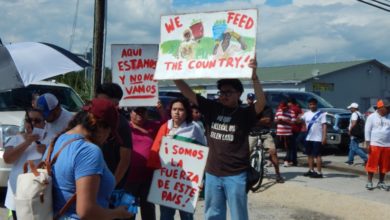On April 17, the Senate’s “Gang of Eight,” a group of four Democrats and four Republicans, unveiled a comprehensive immigration reform bill that has the potential to legalize millions of people, while harshening the immigration law and further militarizing the border. The bill is just the beginning of process involving wider negotiations on what could become “comprehensive immigration reform.”
The bill is clearly a response to the shifting demographics and political dynamic within the country, and would, in its present form, provide considerable relief to immigrant communities that have been struggling for years for legalization. On the other hand, the bill affirms once again that Congress is an institution beholden to the capitalist class. The bill has been drawn up fundamentally to meet business interests, preserving the inequalities of the current system and continuing to criminalize present and future immigrants.
Republicans, Democrats and the mass struggle
Even some leaders of the notoriously anti-immigrant Republican Party have gotten on the immigration reform bandwagon, as they did in 1986 and 2006-07. According to Republican Sen. Lindsey Graham of South Carolina, the new Senate immigration bill, the “Border Security, Economic Opportunity, and Immigration Modernization Act of 2013,” “will pass the [Republican-controlled] House because it secures our borders, it controls who gets a job … [and] the 11 million [undocumented immigrants] will have a pathway to citizenship, but it will be earned, it will be long, and it will be hard.” (emphasis added)
The Republicans recognize that they cannot win a national election in the future if they are known as anti-immigrant or anti-Latino. Considering that the Republicans for years waged war against legalization efforts, this is a significant shift in the relationship of legislative forces. Yet, to preserve their “tough on immigration” rhetoric while recognizing the pressure for reform, they have insisted that the bill contain anti-immigrant policies that punish and further criminalize immigrants. These negative policies magnify rather than eliminate some of the fundamental problems and inequities created by the immigration “system” at the expense of immigrant workers and their families.
In an age of anti-immigrant scapegoating, economic hardship, mass detention and deportation, immigrants have continued to struggle and become a significant political force. On April 10, an estimated 100,000 immigrants and their supporters rallied in front of the Capitol to demand legalization and access to citizenship. The movement has made clear that it wants nothing less than sweeping change of the immigration laws, which leave millions undocumented, routinely deny immigrants’ civil rights and have separated countless families.
If the Democrats were truly in the corner of immigrants, unions and working people—as they claim—this would be the time to press for rapid legalization and the equality that immigrants have long desired. Instead, they have shown their true class allegiances once again, and used this moment to tailor the reform bill to the needs of corporate lobbyists and donors and their Republican counterparts, not immigrant workers.
Unless the powerful voices of immigrant families are heard, and their social force felt, the reform negotiations will be shaped entirely by such capitalist political forces. As in 2006, when the immigrant mobilizations threatened a wider political and social crisis, it is critical for immigrants and allies to take to the streets demanding full rights. Only mass mobilization and action, genuinely threatening the status quo, can win immediate legalization, full legal equality and an end to the terror of deportation. The more we struggle, the more we will be able to win.
Concrete gains
The outcome of the present immigration debate will have a major impact on the conditions and lives of approximately 12 million undocumented people, and millions more in the future.
It is true that the bill would create a process of legalization that would provide millions with protection. This process also would give many access to citizenship, expand the availability of various permanent and temporary visas and facilitate certain types of family reunification. It would include a version of the “DREAM Act,” allowing many undocumented youth to apply for immigration status and permanent residence on a faster track.
Reforms such as these would be concrete victories, and if passed, the legislation would legalize more people—albeit with many unfair stipulations and longer periods of waiting—than other bills in recent history.
Another decade of waiting
As part of the legalization plan, the bill penalizes most immigrants with exceptionally long waits: 10 years before being able to apply for a green card. The bill also includes high application fees and fines. It relies on ensuring that the border is essentially sealed to immigrants through military means and allocates over $6.5 billion to that end. It also attempts to regulate the flow of “low-skilled” workers into the labor market.
Rather than permanent resident status, most immigrants eligible for legalization would have to apply for “registered provisional immigrant” (“RPI”) status first. RPI status is not a permanent visa and does not carry all of the same rights that permanent residence or citizenship does.
Applicants must have been present in the United States on or before December 31, 2011, which means many will not be eligible for RPI status at all. Many simply will not have the required documentation or money to pay for and prove their eligibility.
Others will be ineligible because of the strict criminal history requirements—immigrants, for example, with certain traffic convictions will not be eligible. The Obama administration’s focus on “deporting criminals” led Immigration and Customs Enforcement to set quotas for the apprehension of immigrants. Recently released records showed ICE agents trolling state driver’s license records for information about foreign-born applicants, joining local cops at traffic checkpoints, and processing most immigrants booked into local jails for minor offenses. These “minor offenses” could disqualify many immigrants for legalization.
The imposition of exceptionally long waits before allowing people to apply for permanent residence or citizenship only benefits the corporate interests that maintain economic and political control. A 15-year process delays the ability of millions of people to vote, retains their second-class status in the workplace and society, and deprives them of the ability to collect federal benefits—despite the fact that the government collects taxes from immigrant workers.
The whole time, threats of deportation and immigration detention still loom. This law provides additional grounds for deportation and denial of immigration status for minor, non-violent criminal offenses. It would increase racial profiling by allowing immigration to rely on police accusations of gang affiliation, and preserves the Secure Communities program.
Even with RPI status, it may remain risky for immigrants to temporarily leave the United States and visit family—a big desire for millions of undocumented immigrants.
New forms of family separation
Family unification has long been a main demand of the movement for immigrant rights since so many people live years, if not decades, separated from family members due to their undocumented status. The bill proposes new visas to facilitate bringing family to the United States, but also moves immigration away from a system based on family relations. It favors “merit-based” immigrant visas and increased employment-based visas, and it continues to exclude LGBT couples in the family-based immigration process.
The bill would eliminate two forms of family-based visas currently available. Significantly, older immigrants would no longer be able to petition for adult married children to come to the United States. Sibling visas would also be eliminated. Instead, these family members would need to apply, as others would, for status in the new “merit-based” system, if they are eligible.
The bill also would eliminate the diversity lottery, one way that many families from Africa, Eastern Europe and Pacific Islander nations immigrate to the United States.
In comparison to the right-wing legislation evolving in the House of Representatives, the Senate bill appears family-friendly. The House version proposes an alternative that would require people to return to their home country to apply for immigration benefits. This dangerous proposal would put families at risk of separation for months, if not years, as immigration considers and re-decides the immigrant’s status from abroad. Immigrant families will not accept a proposal that would require people to leave the United States to apply for benefits.
Move to visas based on work
Big business has less control over family-based and diversity immigration. The capitalist class wants more power to grant or deny visas based on its own needs for labor rather than the needs of an immigrant family. Moving toward an immigration system that is intimately tied to an immigrant’s work, certain visas will require advanced degrees and high-tech jobs, while others will be retained in second-class status, and working for poverty wages.
During negotiations, Sen. Chuck Schumer (D-NY), chair of the Judiciary Subcommittee on Immigration, Border Security and Citizenship, facilitated meetings between the AFL-CIO and the U.S. Chamber of Commerce on the issue of “guest worker” visas. The new proposed “W-visa” would set up a limited system of visas, eventually offering “merits-based” permanent residence to immigrants. The bill also includes a visa for agricultural workers with access to permanent residence after five years.
Due to the complexity of the W program and the limited number of visas at least initially, it is unclear how this program will impact immigration to the United States in the future. It is also unclear whether it will end up functioning as a temporary guest worker program, creating a highly vulnerable and underpaid caste of workers, whose legal status is dependent on their employer and thus are less likely to organize.
One thing is clear: these programs benefit big business. The sending and receiving countries’ governments function as labor recruiters for private capitalists, helping them fill “labor shortages” quickly and legally with low-wage workers. Regardless of whatever legal stipulations are added to the visas, supposedly to protect workers, when legal status ties an immigrant to his or her job, it is controlled and manipulated by employers to their advantage.
The struggle for immigrant rights exposes the contradictions of the capitalist system that both wants the freedom to hire and exploit immigrant workers with impunity, as well as use racism and harsh measures against immigrants to divide working class unity and control the labor market.
The struggle ahead
The future of this bill is murky and unknown. Once it goes through Senate negotiations, it will still be subject to attack from the House.
Yet even if this bill were to pass as-is, the immigrant struggle is far from over. In 1986, an amnesty bill was passed, which provided relief to millions. But over the last approximately 25 years, a number of immigration reforms worsened conditions for immigrants in the United States. The economic and political forces stimulating global migration accelerated. Congress passed broad-sweeping negative legislation such as the 1996 Illegal Immigration Reform and Immigrant Responsibility Act, signed by President Clinton. These laws encouraged the exclusion and deportation of millions of people.
Today’s immigration laws have created an underclass of easily exploitable labor, with limited rights, reinforced by growing immigration police, military-style enforcement measures, immigration detention and deportation. This bill does nothing to deal with the policies, interventions and inequalities at the roots of immigration, while the people who immigrate due to them are further criminalized.
The parts of this Senate bill that concede to longstanding movement demands show that immigrants have the power to force change. The demand for legalization has made its way to the halls of Congress, but the movement must grow stronger and make Congress shake to attain the reform that immigrants need. Now is the time to mobilize and demand: Full legalization, full rights, and full equality!






